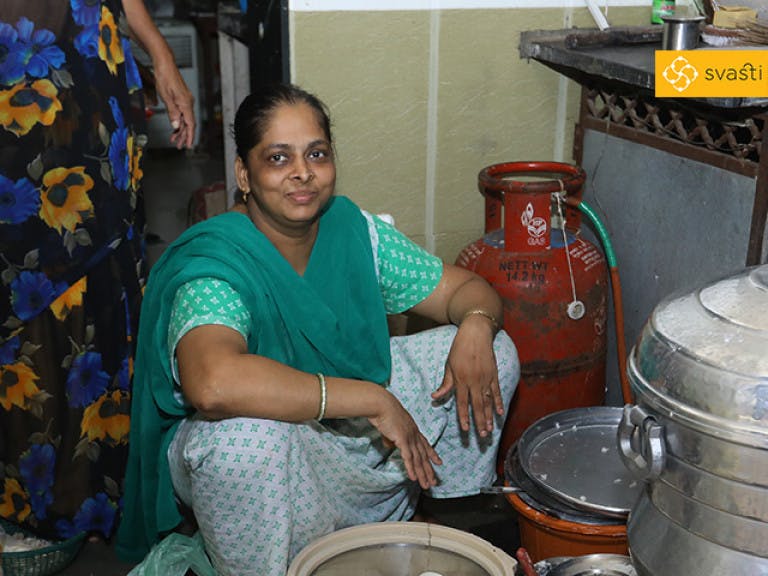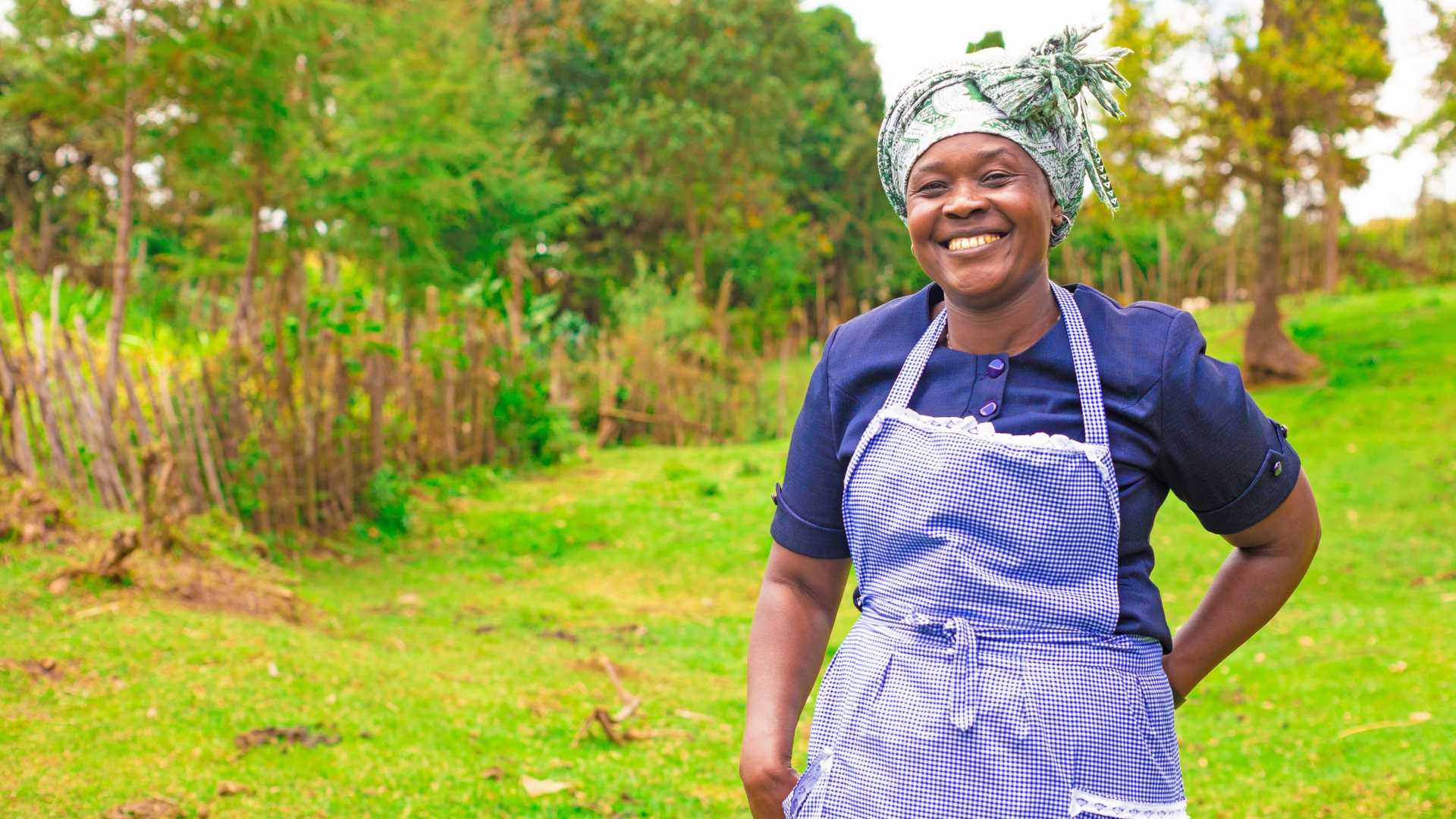
Resilience in tough times for Mumbai's urban poor
Mamta Bombarde, a snack seller from Mumbai, is one of the uncounted millions contributing to the Indian economy through micro-enterprises, many which have been especially hard hit by the effects of Covid-19.
Mamta Bombarde lives with her husband and their two sons in a small house in the Mankhurd slum community of Mumbai, India. A Svasti customer since 2015, Mamta has a small business selling South Indian snacks—mainly idlis and vadas, with chutney and sambar—outside her house.
She’s one of the uncounted millions contributing to the Indian economy through micro-enterprises, many which have been especially hard hit by the effects of Covid-19.
Svasti, an NMI partner based in Mumbai, is focused on the financial wellbeing of enterprising women from economically challenged sections of society. Nearly 65% of Svasti’s 200,000 customers live in Maharashtra, India’s economic powerhouse, and one of the states most affected by the pandemic. Strict lockdowns have carried on in varying degrees since the start of the pandemic. The city of Mumbai—with over 40% of its population living in slums—has borne much of the brunt.
Informal microbusinesses are an integral part of the city’s economy and the major source of income for people living in slum communities, but restrictions and reduced demand have forced many businesses to temporarily or permanently shut down. Many people lost their livelihoods or had their income severely curtailed and needed help to manage the economic shock.
Overcrowding, limited access to health services and shared water and sanitation facilities have also meant many of Svasti’s customers in slum communities faced additional health risks from the pandemic, making them more vulnerable to economic instability.
Support during lockdown
When the first lockdown started in March 2020, Svasti staff working from home set about contacting all customers to understand their health and financial situation and help them make informed decisions. A digital communication and payment platform was launched by Svasti through WhatsApp in early 2020—part of a pre-Covid move to digitise processes—which proved crucial for assisting customers at a distance.
In Mankhurd, Mamta faced mounting financial problems due to lockdown which prevented her from operating the additional puri bhaji business she had started in January 2020 with a loan from Svasti. Once restrictions eased, she began operating her new business from home but was unable to generate much profit due to lower demand. Svasti understood and gave Mamta breathing room to repay her loan installments once financial condition stabilized.
“Our front-line team ensured that all the customers felt supported during these challenging times. Conversations with customers revolved around their well-being rather than collection recovery,” explains Nitesh Sinha, Vice President of Operations Risk Management at Svasti. “We provided comfort that there is no need to worry about their monthly installments (EMIs) and that we will deal with it once the situation improves.”
In both the first and second wave, moratoriums were initially offered via digital channels to those in need, and once lockdown measures subsided, Svasti’s “essential service warriors”, equipped with face masks, and sanitizer were motorbiking back out to communities to help customers in person. Customers were encouraged only to repay loans if their household cashflows had improved, if not they were encouraged to take a restructuring option.
Svasti customer Suraya Shaikh owns a small general shop in Mumbai’s Govandi slum community but could not procure enough stock during lockdown to keep up an income stream, despite her shop being considered an essential service. Svasti were able to grant a three-month grace period in installment payments to tide Suraya over while she sourced more stock.
These customer-friendly strategies paid off: Svasti’s collection efficiency showed steady month-on-month improvement after the initial lockdown periods. They made disbursements of renewal loans to customers who had successfully repaid their current loans and disbursed to fresh groups, which shored up confidence that Svasti would continue to support customers despite the pandemic.
Helping customers back on their feet
As Mumbai emerged from the most recent lengthy lockdown in November 2021, schools re-opened and restrictions on opening hours of shops and restaurants slowly eased—and Svasti is fully focused on supporting customers to get back on their feet. Mamta has both her snack businesses back in operation and has been able to continue to repay her installments on time. Suraya was able to start paying installments once her moratorium period was over, and her shop is now stable and providing an income.
While business activities have not resumed to pre-Covid levels for all customers, most businesses are getting back on track and most customers have resumed some form of income-generation.
Svasti remain focused on understanding the lasting impact of Covid-19 on their customers’ livelihood through close dialogue and awareness of each customer’s sometimes complex individual situation. Customer payment installments, managed responsibly, are moving in a positive direction, and Svasti are anticipating collections reaching pre-Covid levels in March 2022.
Building resilience in unprecedented times
Svasti have been conscious of the possibility of third wave and have taken steps throughout the course of the pandemic—including accelerating technology projects on customer analytics, operations efficiency and risk controls—to ensure they are well-equipped to support customers in any future crisis. Their customers, say Svasti, are less concerned about the future and more focused on the here-and-now. The people of Mumbai have shown great resilience through the different waves of Covid-19 and continue to do so as the latest Omicron situation evolves.
“Our customers are very practical and face challenges head on and overcome them when they arise,” explains Ravi Kumar Nagaram, Svasti’s Vice President of Microfinance Loans. “Their well-being is of utmost importance to Svasti and we will continue to do all we can to ensure all our customers feel valued and cared for during these unprecedented times.”
Read more about Svasti’s work: www.svasti.in
This article was originally published in NMI's Q3 2021 Impact Report
